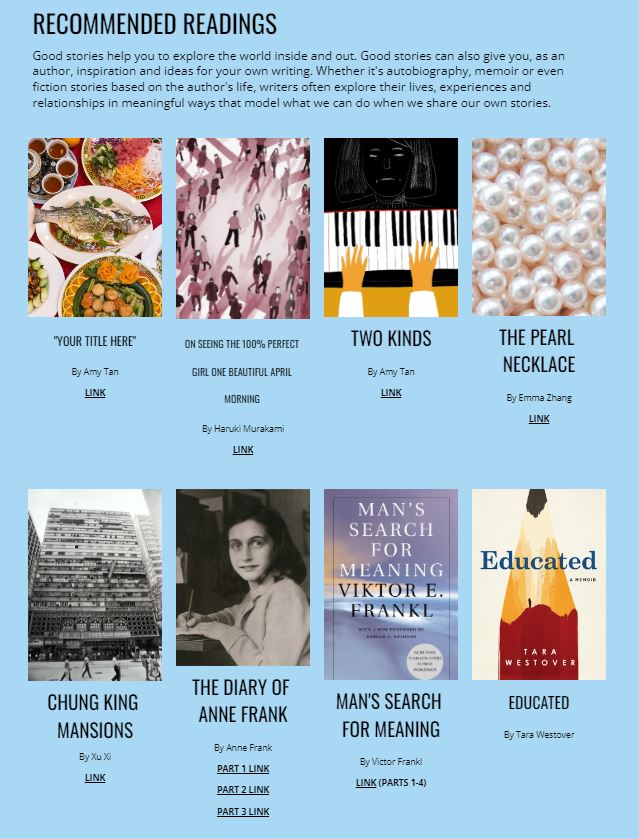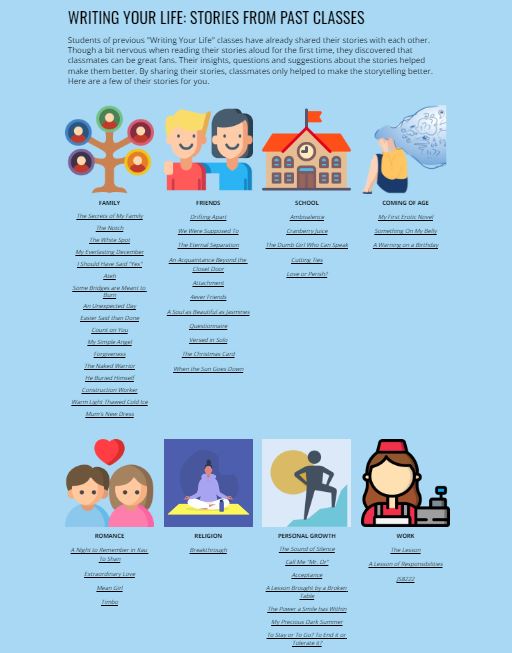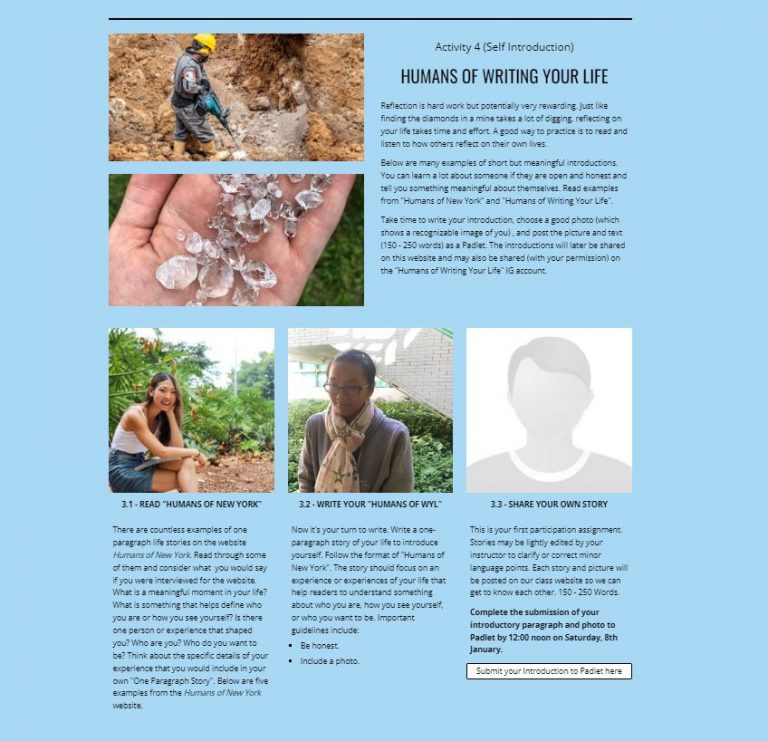“Writing Your Life”:
Improving Storytelling and Classroom Community,
F2F and/or Online
Creating a sense of community in the classroom is correlated to more active student participation, engagement, retention of learning (Stubb, J., Pyhalto, K., & Lonka K., 2011). Classroom community also creates affective advantages among students, such as commitment, a sense of belonging, and a feeling of shared goals with the teacher and classmates. Such advantages are indeed aspects of the very definition of community. Teachers particularly struggle with creating a sense of community during online and blended classes. Through teaching this course in F2F, online and blended modes, engagement and satisfaction of students during these modes may be compared. Moreover, the use of educational APPS such as Padlet, Flipgrid and a Google Site tailored to this course are seen to be effective in building classroom community.
Life Writing
Experience Sharing
Blogging
Peer Assessment
Course Context: Writing Your Life
Teaching Mode: Blended Teaching
Referred Framework: PAVE Stream
Core e-Resources: Google Sites, Padlet, Flipgrid
Writing Your Life aims to nurture a sense of class community. Since the beginning of this course in 2017 until now, it has evolved to introduce new activities to increase student engagement, integrating technology in the blended and online course and focusing on pedagogy to increase the sense of community in the classroom. By using technology-enhanced teaching modes through blogs, the separation between student and teacher is minimized, thus creating a stronger class community.
In this course, the maxim that “the unexamined life is not worth living” is turned into positive action. Students learn to examine their lives closely in order to make it more worthwhile and meaningful. The course offers “life writing” (including “autobiographical writing”, “memoir writing”, “journaling” and “future authoring” (Finnie, 2017)) as a process for students to learn to examine, articulate and better understand their own life values, including what is determined by choice and attitude. Students will use spoken and written English to articulate and discuss concepts and issues related to life experience, attitudes and writing. They will study historical and contemporary examples of autobiographical writing as a reference for critical self-reflection as well as the art of self-expression. Through this systematic examination of life writing samples and their own experience of personal life writing and reflection, students will become more self-aware, better communicators and more able to make positive, healthy and productive life choices by more consciously and proactively choosing the values that form the character of their “future self”.
By the end of the course, students should:
- Demonstrate an understanding of the art and techniques of effective life writing through an examination of models of writing and the experience of autobiographical writing;
- Apply the knowledge and skills of effective life writing to communicate stories and reflections of their own lives;
- Examine the impact of values, attitudes, and choices on life patterns, including the formation of future character to improve critical reflection and an understanding of the importance of positive values.
- Demonstrate competence and confidence of communication in English about meaningful life events and their relationship to positive values.
Research Results: Survey and Interviews
- 2020-2021 Sem 2
- 2021-2022 Sem 1
- 2021-2022 Sem 2
This report is the analysis of a quantitative study about the learning experience of students in GEK2012- Writing Your Life Crouse in the middle of the course. 14 students (82.3%) responded to the survey on 23/4/2021. There are a total of seven questions in the survey: Five of them are 4 point scale questions (Strongly Disagree → Strongly Agree) and two of them are open ended questions regarding students’ interest and suggestions.
- Class Requirements: Over 90% of students acknowledged the requirements of the lesson. Nine students (64.3%) Strongly Agreed and Four students (28.6%) Agreed that they understood the requirements.
- Learning Activities: All students thought the learning activities in this course were appropriate. Half of the students Strongly Agreed and the other half Agreed with this statement.
- Online Learning Effectiveness: All students consented with the high effectiveness of online learning in this course. Twelve students (85.7%) Strongly Agreed and Two students Agreed (14.3%) with this statement.
- Life Writing Skills: All students assented that they could learn the skills to ‘write their life’ from this course. Nine students (64.3%) Strongly Agreed and Five students (35.7%) Agreed with this statement.
- Encouraging Reflection: Over 90% of the students consented that they were encouraged to make reflection on the meaning of their life in this course. Six students (42.9%) Strongly Agreed and Seven students (50%) Agreed with this statement.
2021-2022 Semester 2 Survey Results:
A survey sent to the whole class allowed students to give quantitative feedback on the effectiveness of apps and activities used to teach the course, as seen in the chart above. Several students were asked to share their experiences in a semi-structured interview in order to provide qualitative responses regarding their perspective of the course and the effectiveness of online learning apps in facilitating learning.
Strengths about the course delivery included:
- Course website: special to have a website designed only for one course; useful as everything can be found there; more convenient than Moodle.
- Reading: good mixture of reading others’ stories (e.g. Annie’s diary and Infant’s story) and writing one’s own stories (e.g. turning point); able to learn from each other and reflect on one’s own lives.
- Writing: help students write from zero to one on a step by step basis; help students to learn how to write, edit and comment; various writing assignments.
- Grouping: discussions are more efficient when students were divided into groups.
- Peer editing workshops: help students to learn what works and what doesn’t in writing; able to learn writing techniques and others’ experiences at the same time; able to listen to others’ stories and also receive feedback from them; find “negative comments” actually helpful to one’s writing.
- 100% of students who answered the survey Strongly Agreed or Agreed that Kahoot quizzes were helpful in self assessing their understanding of content
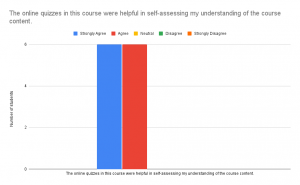
- 91.6% of those who answered the survey either Strongly Agree or Agree that:
- Online activities such as Padlet, Flipgrid and Kahoot made them a more active learner
- Online learning activities and resources allowed them to engage with material more effectively
- These activities provided good opportunities for students to interact with their peers
- Online resources enhanced their learning experience
- The online guided activities on the Website and Google Forms provided a platform for meaningful discussion about the course content
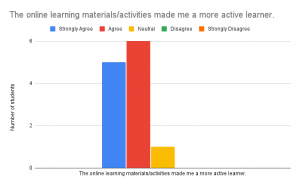
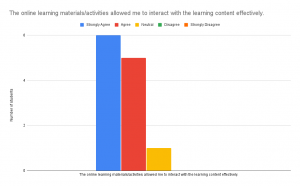
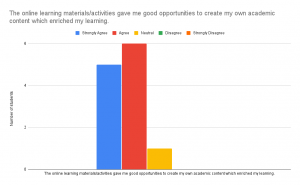
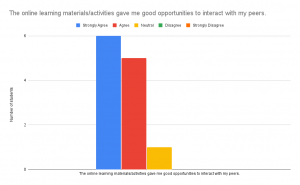
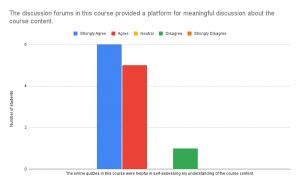
- 83.3% either Strongly Agreed or Agreed that online resources were user-friendly
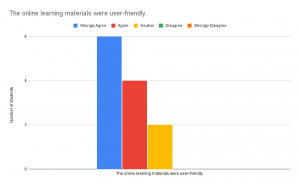
This class has let me feel connected. I feel more empathetic and I feel less egoistic, because…right now when I’m speaking to a person or when I’m making friends, I am conscious. There is always story behind someone’s life. So you have to consider that as an empathetic listener and when being a conscious friend.
“I think online learning still works, especially Dr. Tim gave because there are a lot of tools to help enhance understanding, like the Google Doc, Padlet, which I didn’t know in the past, so this is my first time to came across them and I find it is very effective.”
“Dr Taylor has made it very convenient for us because of the website, he has all of the assignments, the requirements, what we will be doing in each class all of the resources are in one place which I thought was brilliant because it was very informative and I never felt lost at any moment.”
“I think hearing other people’s stories helps me also feel more positive about life, so I know that there are always ways that I can handle different problems.”
Conclusions
Data from surveys and interviews suggests that students tend to enjoy interactive aspects of the course the most, and while the circumstances for student-student and teacher-student interactions are not ideal during an online semester, online platforms such as discussion forums, Padlet and Blogspot provide effective opportunities for students to engage with each other and with course material. Quotes from interviews of past students suggest that the Writing Your Life course itself allows students to feel more connected with one another by sharing their personal journeys. This environment therefore nurtures a sense of community in which students feel free to let their guard down and form connections with others in the class, as well as teach them life-long lessons about empathetic listening.
Online interaction between student will be made even more effective as the following goals are in place:
- Increase students access to student-student platforms for sharing
- Publish a volume of students’ stories
- Launch a public website for teaching and learning life writing
Further Research will include:
- Conducting the Sense of Classroom Community Index survey, a validated instrument to determine sense of classroom community (designed for higher education)



